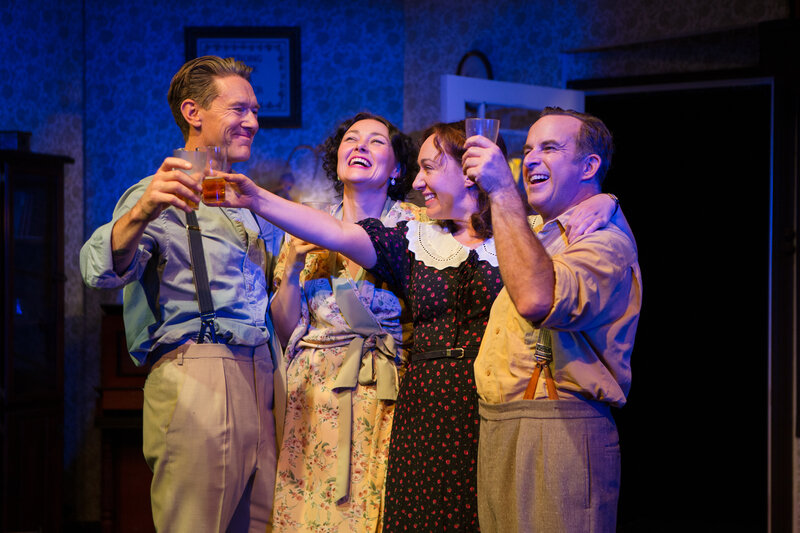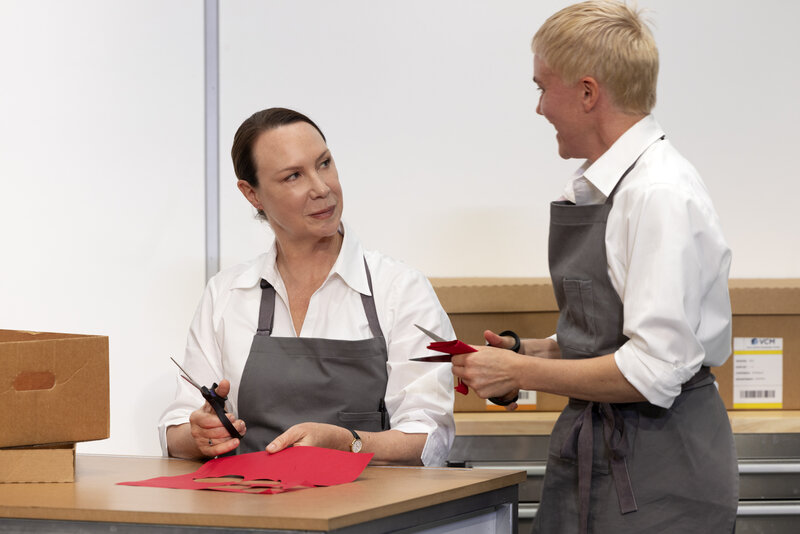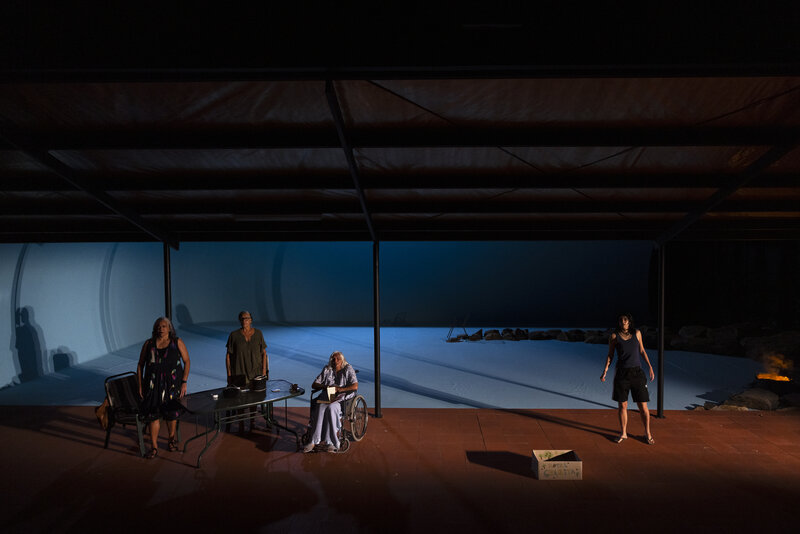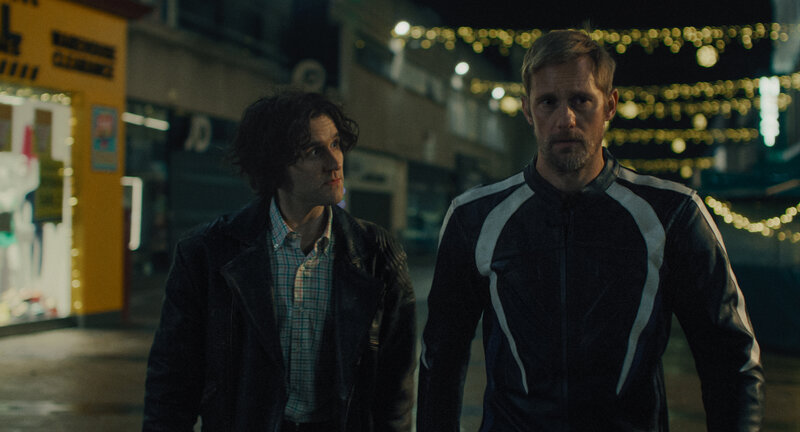Good People, by David Lindsay-Abaire was first performed in 2013 for the Manhattan Theatre Club, at the Samuel J. Friedman Theatre, on Broadway, New York and was awarded the New York Drama Critics Circle Award for Best Play, The Horton Foote Prize, The Edgerton Foundation New American Play Award, and two Tony nominations. It follows on from his previous play Rabbit Hole, which among other prizes won the Pulitzer Prize. Good People sustains the quality of writing exhibited in his other work and is given a very good production at the Ensemble Theatre, for Sydney audiences, under the controlled direction of Mark Kilmurry.
 Margaret Walsh – “Mar-Gee” – (Tara Morice) is a working class survivor from Southie in Boston (remember the world of Johnny Depp’s recent film, Black Mass). She is a single mother, with an intellectually disabled adult daughter, Joycey, whose idea of a night out is a visit to the local Bingo hall with friends – hoping to win some cash – because her monthly paycheck just covers her month’s bills. She has just lost her job as a ‘check-out chick’ at the local supermarket, because of habitual tardiness, and so faces eviction and is scrambling for a break. Some of the Good People, her neighbourhood girlfriends, Dottie (Gael Ballantyne) and Jean (Jane Phegan) recommend that she contact an old ‘flame’ of her’s, Mike (Christopher Stollery), who having left Southie has become a Doctor – ‘a reproductive endocrinologist’ -and has recently returned and is living in up-market Chesnut Hill, and may be able to give her a job.
Margaret Walsh – “Mar-Gee” – (Tara Morice) is a working class survivor from Southie in Boston (remember the world of Johnny Depp’s recent film, Black Mass). She is a single mother, with an intellectually disabled adult daughter, Joycey, whose idea of a night out is a visit to the local Bingo hall with friends – hoping to win some cash – because her monthly paycheck just covers her month’s bills. She has just lost her job as a ‘check-out chick’ at the local supermarket, because of habitual tardiness, and so faces eviction and is scrambling for a break. Some of the Good People, her neighbourhood girlfriends, Dottie (Gael Ballantyne) and Jean (Jane Phegan) recommend that she contact an old ‘flame’ of her’s, Mike (Christopher Stollery), who having left Southie has become a Doctor – ‘a reproductive endocrinologist’ -and has recently returned and is living in up-market Chesnut Hill, and may be able to give her a job.
“Mar-Gee” being a Good Person, too, though not accepting the truth of a cancellation of a party at Chesnut Hill, makes an inconvenient visit to the home of Mike and meets his wife, Kate, (Zindzi Okenyo), an African-American academic. The unconscious jealousies and frustrations of “Mar-Gee’s” life opportunities boil over in an interaction with this fragile couple, who are coping with a sick child and, perhaps, a delicate marriage, and consciously reveals secrets and, maybe, lies, that may destroy the fabric of this ‘lace-curtain Irish’ Mike’s life.
The dilemma of the play is the question of the level of consciousness in ‘Mar-Gee’s’ and her friends’ verbal and physical actions. The play examines what means of survival are available for a class who have next to nothing and are searching for the way to that promised American Dream, and who are struggling, as the Willy Loman family did several generations before, and by necessity have to shift loyalties and make behavioural choices with cunning agility to sustain their unshakeable hopes for that promised, better future. There are definitely times in this play, when “Mar-Gee” and her circle are reprehensible and the last people you want to know and or engage with. We are certainly challenged about our own lives, with the wily writing of Mr Lindsay-Abaire: Can we honestly, ‘judge’ these good people?
Says Mr Lindsay-Abaire, in interview:
We have this myth that if you work hard, you can accomplish anything. It’s not a very American thing to say, but I don’t think that’s true. It’s true for a lot of people, but you need other things to succeed. You need luck, you need opportunity, and you need the life skills to recognise what an opportunity is.
 The performances of this production are of a high order with all the actors relishing the opportunities that Mr Linsay-Abaire has given them, for all the characters are written in an intriguingly complex manner – no-one and no event that happens in this play are in the cliched mode of the usual storytelling, despite the familiar circumstances. The characters in the play have the audience’s loyalties shifting as we try to find (unconsciously, perhaps) the character that we can wholeheartedly identify with and give our undiluted empathy too. There is one and it comes unexpectedly to us in the actions of Stevie (Drew Livingston), someone that we may have not much noticed but who we can really call, at the play’s end, a Good People.
The performances of this production are of a high order with all the actors relishing the opportunities that Mr Linsay-Abaire has given them, for all the characters are written in an intriguingly complex manner – no-one and no event that happens in this play are in the cliched mode of the usual storytelling, despite the familiar circumstances. The characters in the play have the audience’s loyalties shifting as we try to find (unconsciously, perhaps) the character that we can wholeheartedly identify with and give our undiluted empathy too. There is one and it comes unexpectedly to us in the actions of Stevie (Drew Livingston), someone that we may have not much noticed but who we can really call, at the play’s end, a Good People.
Mr Stollery and Ms Okenyo (at last in a role on a Sydney stage, that permits this actor to reveal her complexity of gifts), give dextrously excellent performances, and along with Ms Morice – in great form -, blister the production with a thrilling trio-entanglement in the major scene of the second act. The writing is crisp, witty and marvellously observed and structured, giving a thrilling word-by-word experience for an enthralled, and sometimes, to-be-appalled, audience.
The set design by Tobhiyah Stone Feller, is one of the best I have seen in this small space. It has a fluidity and integral, organic, aesthetic that seems to seamlessly move from the location demands, one to the other, of the play, with minimal effort. Ross Graham, reveals his creative gifts, working within a much smaller scale than much of his other good work of late (An Index of Metals), and has created a terrifically empathetic lighting design of atmospheric support.
Good People is really good writing, supported by a really good production, all round. Go.
Good People is playing at the Ensemble Theatre, Kirribilli, Sydney until 21 May 2016, and you can buy tickets here.
Kevin Jackson
For more of Kevin Jackson’s theatre reviews, check out his blog at Kevin Jackson’s Theatre Diary

David Edwards is the former editor of The Blurb and a contributor on film and television




